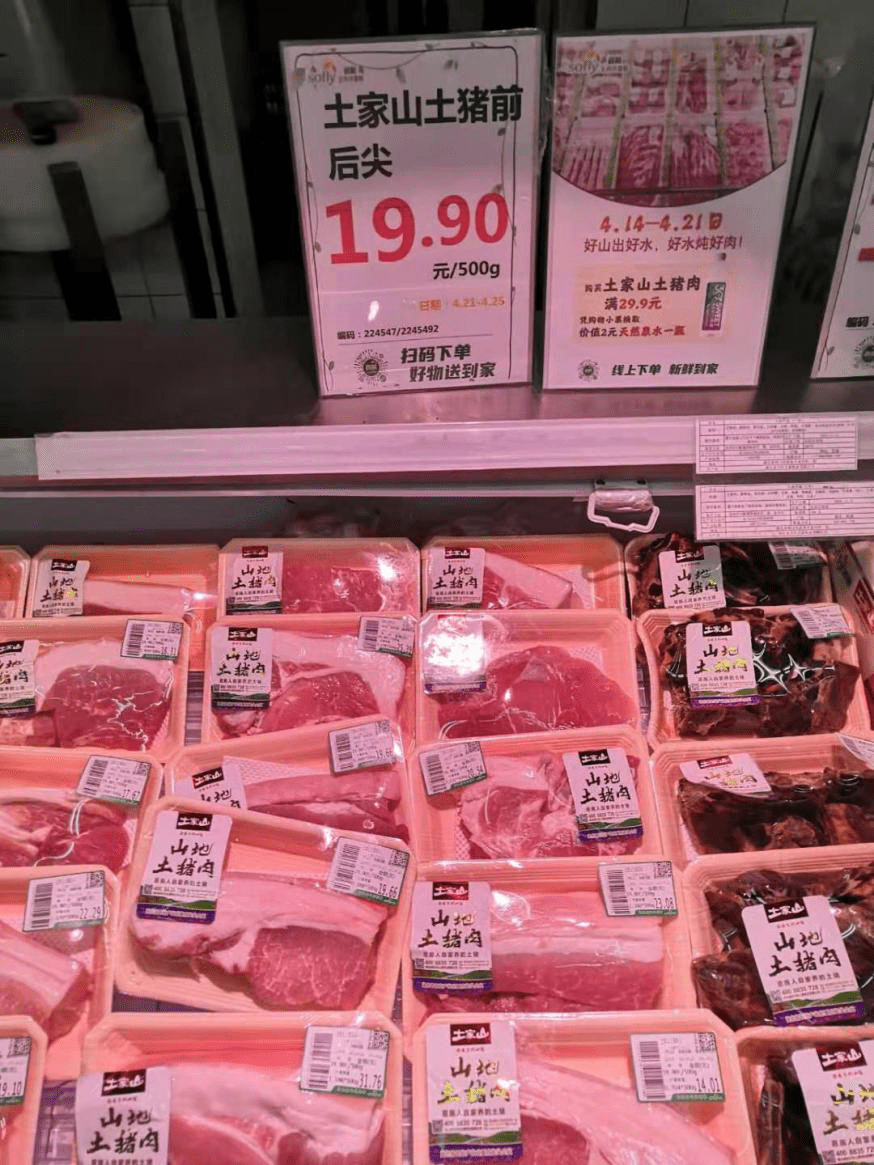The aura of Wen’s shares, which is known as the “most profitable listed pig company” in 2019, is no longer: last year’s revenue increased slightly, and net profit fell sharply. The executive team is raising salaries and launching a share-based incentive plan, which has aroused the attention of the exchange and doubts from investors. What happened to the “most profitable pig company” in the past?
At present, more than half of the financial reports of A-share listed pig companies have been disclosed. In 2020, the net profit of Wen’s shares is about 7.426 billion yuan, a year-on-year decrease of 46.83%. In contrast, Muyuan’s 2020 performance report shows that it belongs to listed companies The net profit of shareholders is approximately 24.751 billion yuan, a year-on-year increase of 348.97%. The net profit of Wen’s shares is less than one-third of Muyuan shares.
On April 22, Wen’s shares closed at 15.16 yuan per share, a single-day drop of 2.82%, and a total market value of 96.622 billion yuan.
“The most profitable listed pig company” is no longer aura, Wen’s shares report the reasons for the decline in performance
The financial report shows that in 2020, Wen’s shares will achieve operating income of approximately 74.924 billion yuan, an increase of 2.47% year-on-year; the net profit attributable to shareholders of listed companies is approximately 7.426 billion yuan, a year-on-year decrease of 46.83%; the deduction of non-profits attributable to shareholders of listed companies The net profit from recurring gains and losses was approximately 6.381 billion yuan, down 51.11% year-on-year.
Facing the decline in performance, Wen’s shares said there are three reasons.
First of all, due to the oversupply of the live poultry market and the declining demand for poultry meat in the catering industry under the new crown pneumonia epidemic, the sales price of live poultry has dropped significantly compared with the same period in 2019. In 2020, Wen’s shares will sell 1.051 billion broilers (including hairy chickens, fresh products and cooked foods), and 56.928 million meat ducks (including hairy ducks and fresh products). The average sales prices of hairy chickens and hairy ducks have dropped by 21.79% year-on-year. 32.94%, the profit of chicken and duck farming business fell sharply year-on-year, and there was a large loss.
Secondly, in 2020, the impact of the domestic African swine fever epidemic will still be severe. In order to control risks, Wen’s Co., Ltd. proactively adjusted the progress of piglet distribution and production in the early stage. During the reporting period, the company’s pig production decreased accordingly; in addition, under the influence of the African swine fever epidemic, it actively eliminated some threatened sows and kept sows. The overall production performance of the pigs has declined, resulting in a phased reduction in the number of healthy piglets on the breeding farm. At the same time, the market rate of pigs in the fattening process has also declined.
As a result, Wen’s shares will sell 9.5455 million pigs (including hairy pigs and fresh products) in 2020, a year-on-year decrease of 48.45%. Although during the reporting period, the company’s average sales price of hairy pigs increased by 79.95% year-on-year, the sales revenue of pigs (including hairy pigs and fresh products) only increased by 0.72% due to the large year-on-year decline in the sales volume of pigs (including hairy pigs and fresh products).
Third, in order to increase the stickiness of farmer cooperation and promote the stable and continuous growth of breeding resources, Wen’s Co., Ltd. will implement the “company + farmer” long-term cooperation mechanism in the second half of 2019, sign long-term cooperation agreements with cooperative farmers, and set up The related rules on poultry listings and net profit share income with raisers. During the reporting period, the amount of income shared by cooperative farmers was 1.19 billion yuan.
When the pig price went up, the sales volume missed a good opportunity. Now, the pig price goes down, and Wen’s quarterly report this year is not good.
In the first quarter of 2021, Wen’s shares achieved operating income of 16.816 billion yuan, a year-on-year decrease of 3.60%; net profit attributable to shareholders of listed companies was 544 million yuan, a year-on-year decrease of 71.28%.
At a time when net profit fell, the executive team’s salary increased sharply last year, and the stock incentive plan attracted the attention of the exchange
Although last year’s performance was not satisfactory, Wen’s senior management team is raising salaries. In 2019, Wen’s Co., Ltd. paid a total of RMB 63,299,100 to a total of 26 directors, supervisors and senior managers; in 2020, Wen’s Co., Ltd. paid a total of RMB 96,123,300 to a total of 30 directors, supervisors and senior managers.
Shell Finance reporter noticed that the annual salary (before tax) of Chairman Wen Zhifen and Vice Chairman Yan Juran has increased from RMB 5,244,100 and RMB 5,236,700 respectively in 2019 to RMB 6,886,100 and RMB 6,229,400 in 2020. In other words, Chairman Wen Zhifen increased his salary last year by 1.64 million yuan, and Vice Chairman Yan unexpectedly increased his salary last year by nearly one million yuan. The annual salary (before tax) of Wen Pengcheng, Wen Junsheng, Wen Xiaoqiong, Huang Songde, and Yan Juneng, the directors of Wen’s Co., has increased from 5.0496 million yuan, 2.2803 million yuan, 3.188.8 million yuan, 1.4762 million yuan, and 2.18224 million yuan respectively in 2019 to 2020. In the year, 5.788 million yuan, 2.3104 million yuan, 4.686 million yuan, 1.8468 million yuan, 3.0932 million yuan.
In addition, the above-mentioned seven people will not receive compensation from Wen’s related parties in 2019, and will receive compensation from Wen’s related parties in 2020.
The actual controllers of Wen’s shares are the Wen family, specifically Wen Pengcheng, Wen Junsheng, Wen Zhifen, Wen Xiaoqiong, Liang Huanzhen, Wu Cuizhen, Wen Zirong, Chen Jianxing, Liu Rongjiao, Sun Fen, and Gu Jinying, a total of 11 people.
Yan Juran and Yan Juneng are brothers; Huang Songde, born in 1953, has a bachelor’s degree. In 1992, he joined Wen’s predecessor and served as director of the company’s office, vice president, secretary of the board of directors, and director.
In addition to a substantial salary increase for executives, Wen’s recently proposed third-phase restricted stock incentive plan has also attracted attention.
The draft shows that the incentives granted by the incentive plan for the first time do not exceed 3741 people, including company directors, senior managers, actual controllers and their spouses and children. According to the announcement, the incentive targets involved 9 people including Chairman Wen Zhifen, Honorary Chairman Wen Pengcheng, Director Wen Junsheng and Wen Xiaoqiong. The above 9 persons will be awarded a total of 6.33 million shares. Calculated according to the closing price of Wen’s shares today, the total market value of these shares is about 95.96 million yuan.
“The company has the face to motivate itself in this way,” some investors expressed dissatisfaction with the incentive plan in the stock bar.
On April 20, the Shenzhen Stock Exchange issued a letter of concern to Wen’s shares, asking Wen’s shares to explain: “The actual controllers of the company’s Wen family members, their spouses, parents, and children’s specific positions and main responsibilities are planned to be Whether the basis and reasonableness of the number of shares granted are consistent with their duties and contributions.”
Pork prices have dropped for 12 consecutive weeks, what should pig companies do?
On April 19, the Ministry of Agriculture and Rural Affairs released information that “the average weekly price of pork in the wholesale market was 31.62 yuan per kilogram, a decrease of 2.8% from the previous month, which was a 12-week decline, with a cumulative decrease of 33.1%, which was 30.1% lower than the same period last year.”
Recently, the reporter visited and found that more than 10 yuan a catty of pork had appeared in the supermarket.

Faced with the downward price of pigs, how do pig companies respond?
Wen’s shares said: “In 2021, the price of commodity pigs is expected to remain at a relatively high level, and the annual average price is estimated to be 22-24 yuan/kg.”
In 2021, Wen’s stock plan: “The pig industry should continue to strengthen the construction of the biosafety system, and through the implementation of the most stringent biosafety prevention and control measures, the threat of the disease will be minimized, and the goal of the 2021 slaughter plan will be completed with all efforts. To lay a solid foundation for the goal of slaughter pigs in 2022. Reshape the pig breeding system and improve the breeding capacity and quality of breeding pigs.”
On March 16, Muyuan said: “Currently, there is still a gap between supply and demand. Compared with other normal years, the price of live pigs has increased by more than 10 yuan/kg. Although live pigs are bulk commodities, China’s consumption of fresh meat is the main product. The characteristics determine that market clearing can be achieved through price adjustments every year, and the elasticity of supply is greater than that of the industry, and it is unlikely that the industry will suffer continuous long-term losses.
According to media reports, on April 20th, Chen Guanghua, Deputy Director of the Animal Husbandry and Veterinary Bureau of the Ministry of Agriculture and Rural Affairs, introduced at the meeting: “The main reason for the recent sharp drop in pig prices is the significant increase in live pig production and the decline in pork consumption after the Spring Festival. The two factors have come together. In addition, some farmers panic slaughter has formed a “stomping effect”. According to the trend of the annual pig price, around the Dragon Boat Festival, as the consumption of pork increases, the price of pigs may rise. But. Calculating from the number of newborn piglets in the previous period, it is expected that in the second quarter, the year-on-year increase in fat pig output from large-scale pig farms across the country will reach 50%. The market supply is generally abundant, and the price is unlikely to exceed the previous high.”
“On the whole, the most tight period of pork supply has passed, and the supply will become more and more loose in the later period. According to the current production recovery momentum, in June and July this year, the live pig inventory is expected to return to the level of normal years. There will be four more years later. In about a month, the monthly output will gradually return to the average level.” Chen Guanghua said.
Beijing News Shell Finance reporter Yan Xia editor Li Weijia proofreading Li Shihui





























































You must log in to post a comment.